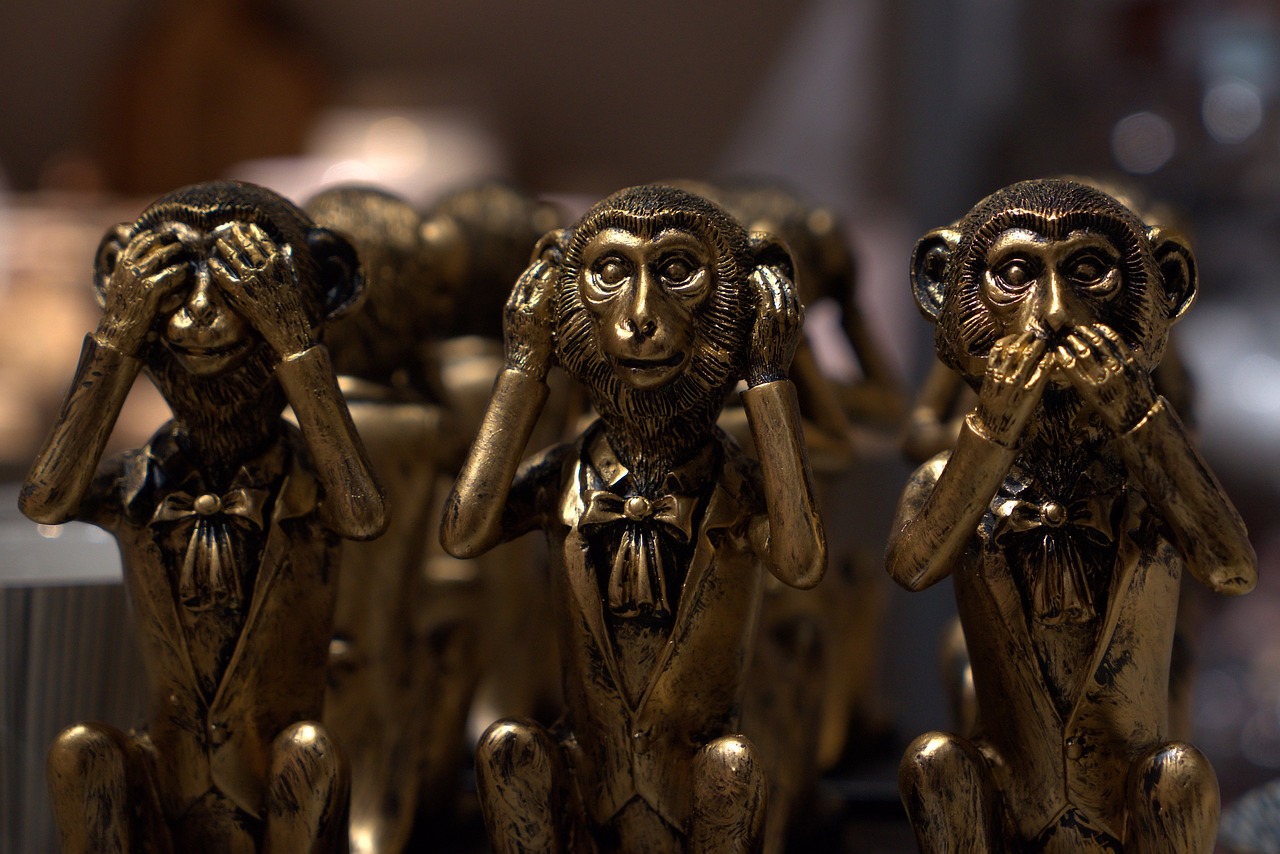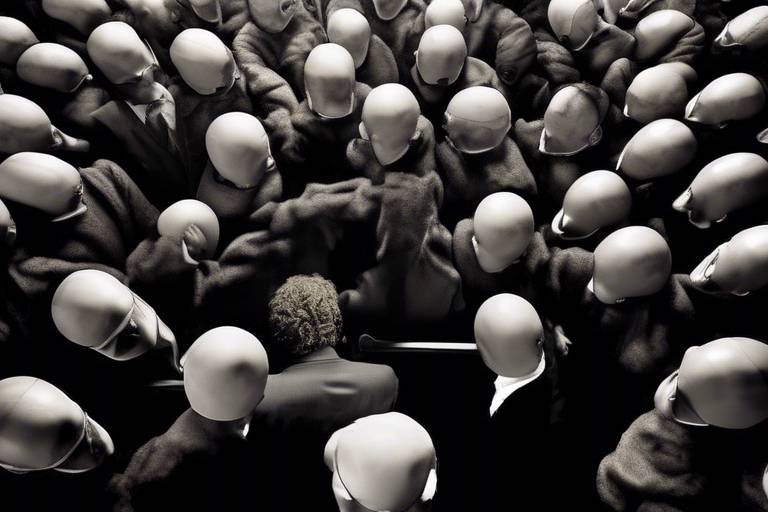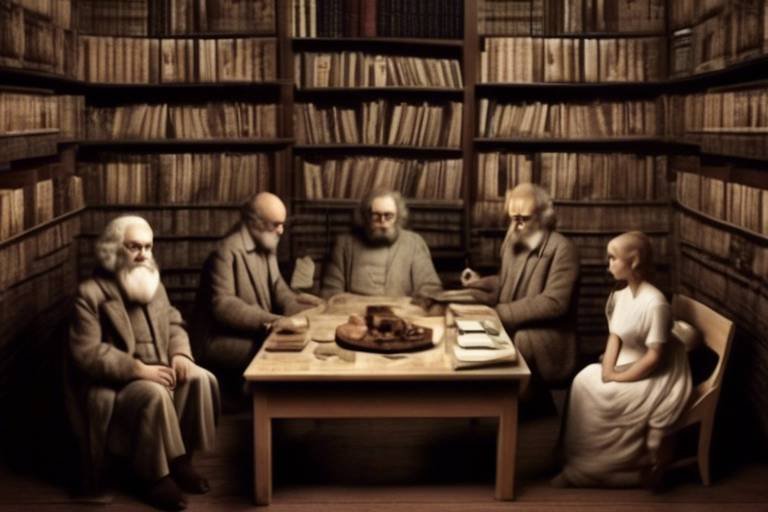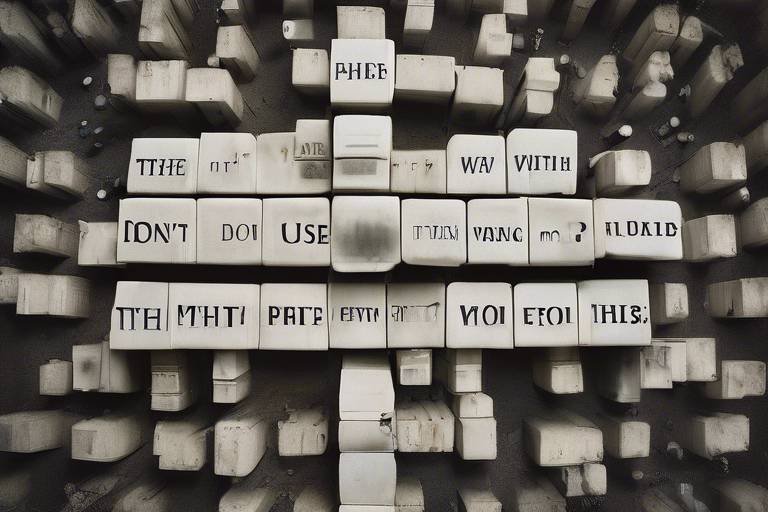Is Morality a Social Construct?
The question of whether morality is a social construct has sparked intense debates among philosophers, sociologists, and everyday people alike. At its core, this inquiry delves into the very essence of what it means to be "good" or "bad." Are our moral values innate, or are they shaped and molded by the societies we inhabit? This article seeks to unravel this complex tapestry, exploring the nuances of morality through various lenses.
To understand morality, we first need to define it. Morality can be viewed as a set of principles that guide our behavior and interactions with others. It serves as a compass, helping us navigate the murky waters of human relationships and societal expectations. But where do these principles come from? Are they hardwired into our DNA, or are they influenced by the cultural contexts in which we live? This inquiry is not just academic; it has real-world implications for how we judge actions, create laws, and foster communities.
Many argue that morality is a social construct, arguing that our beliefs about right and wrong are shaped by cultural norms, historical contexts, and societal pressures. Think about it: what is considered "moral" in one culture might be deemed "immoral" in another. For instance, practices such as polygamy or arranged marriages are accepted in some societies but frowned upon in others. This leads us to wonder: if morality varies so widely, can it really be an inherent part of human nature?
On the flip side, there are those who contend that certain moral truths are universal, transcending cultural boundaries. Concepts like fairness, justice, and empathy appear to be shared across many societies, suggesting that there may be an underlying moral framework that is part of our human experience. This raises intriguing questions about the interplay between our biological instincts and the societal constructs we create.
As we dive deeper into this topic, we will explore historical perspectives, psychological insights, and philosophical theories that have shaped our understanding of morality. By examining these various angles, we hope to shed light on the intricate relationship between morality and society, ultimately answering the question: Is morality a social construct, or is it something more fundamental to our existence?
- What is morality? Morality refers to the principles that govern our behavior regarding what is right and wrong.
- Can morality change over time? Yes, moral beliefs can evolve as societies change and develop new understandings.
- Are there universal moral principles? Some argue that certain moral values, like justice and fairness, are universal, while others see morality as entirely culturally specific.
- How does culture influence morality? Culture shapes our perceptions of right and wrong, affecting everything from laws to personal beliefs.

The Nature of Morality
This article explores the concept of morality, examining whether it is an inherent part of human nature or shaped by societal influences. We will delve into various perspectives and implications surrounding this debate.
Understanding what morality is and how it functions in society is crucial. At its core, morality refers to the principles that govern our perceptions of right and wrong, guiding our actions and interactions with others. Think of it as the invisible thread that weaves through the fabric of human relationships, binding us together with shared values and norms. Morality can be seen as a compass, helping us navigate the often murky waters of ethical dilemmas and social conduct.
But where does this compass come from? Is it hardwired into our brains, or is it shaped by the cultures we grow up in? To answer these questions, we must consider the multifaceted nature of morality. It encompasses a range of elements including empathy, social norms, and cognitive reasoning. For instance, many psychologists argue that our ability to empathize with others plays a significant role in moral decision-making. When we can put ourselves in someone else's shoes, we are more likely to act in ways that are considerate and just.
Moreover, social norms heavily influence our moral beliefs. These norms are the unwritten rules that dictate acceptable behavior within a community. They vary significantly from one culture to another, which raises an intriguing question: if morality is so dependent on social context, can it be considered universal? For example, practices that are deemed acceptable in one society may be viewed as abhorrent in another. This leads us to explore whether there are any universal moral principles that transcend cultural boundaries.
To illustrate this point, consider the following table that outlines some common moral principles and their variations across different cultures:
| Cultural Context | Moral Principle | Variation |
|---|---|---|
| Western Societies | Individual Rights | Emphasis on personal freedom and autonomy |
| Eastern Societies | Collectivism | Focus on family and community well-being over individual desires |
| Indigenous Cultures | Harmony with Nature | Strong connection and respect for the environment |
As we can see, while certain moral principles may be widely recognized, the interpretation and application of these principles can differ dramatically across cultures. This leads us to the conclusion that morality is not just a static set of rules but a dynamic system shaped by historical, social, and psychological factors.
In summary, the nature of morality is a complex interplay of inherent human traits and social influences. It serves as a guide for behavior, shaped by our ability to empathize, the norms of our society, and the historical context in which we live. Understanding this multifaceted nature of morality can help us navigate the ethical landscapes we encounter in our daily lives.
- What is the difference between morality and ethics? Morality refers to personal principles of right and wrong, while ethics involves the rules provided by an external source, such as codes of conduct in organizations or societies.
- Can morality change over time? Yes, moral standards can evolve as societies change and develop, reflecting new understandings and values.
- Is there such a thing as universal morality? While some principles may be universally accepted, the application and interpretation of these principles can vary significantly across cultures.

Historical Perspectives on Morality
The concept of morality is not static; rather, it has undergone significant transformations throughout history, shaped by various cultural, social, and philosophical influences. To truly grasp the essence of morality, one must explore how different civilizations have defined and redefined what is considered 'right' and 'wrong' over the ages. From ancient civilizations to modern societies, moral beliefs have evolved, often reflecting the values and norms of the time. This evolution can be likened to a river, constantly flowing and reshaping its banks based on the environment it traverses.
In ancient cultures, morality was often intertwined with mythology and religion. For instance, in ancient Greece, philosophers such as Socrates, Plato, and Aristotle laid the groundwork for ethical thought, emphasizing reason and virtue as guiding principles. Their ideas prompted individuals to reflect on the nature of goodness and the pursuit of a virtuous life. Similarly, in ancient China, Confucianism emerged, advocating for moral integrity, familial respect, and social harmony as essential components of a well-ordered society.
As we journey through history, we encounter periods where moral beliefs were challenged and redefined. The Enlightenment era, for example, marked a significant shift in moral philosophy. Thinkers like Immanuel Kant introduced the idea of deontological ethics, which emphasized the importance of duty and adherence to moral laws rather than the consequences of actions. This intellectual revolution encouraged individuals to question traditional moral frameworks and consider the implications of their choices based on reason and autonomy.
Moreover, the influence of religion cannot be understated when discussing historical perspectives on morality. Various religious texts and teachings have profoundly shaped moral beliefs across cultures. For instance, the Ten Commandments in Christianity and Judaism provide a foundational moral code that has influenced Western ethical thought for centuries. Similarly, the teachings of Buddhism emphasize compassion and the alleviation of suffering, guiding moral conduct in many Eastern societies.
To illustrate the diverse moral frameworks that have emerged throughout history, consider the following table, which highlights key moral philosophies and their origins:
| Philosophy | Origin | Key Principles |
|---|---|---|
| Utilitarianism | 19th Century, Jeremy Bentham | Greatest happiness for the greatest number |
| Deontology | 18th Century, Immanuel Kant | Duty and adherence to moral laws |
| Virtue Ethics | Ancient Greece, Aristotle | Focus on character and virtues |
| Confucianism | Ancient China, Confucius | Moral integrity and social harmony |
As we can see, the tapestry of morality is woven with threads from various cultures and philosophies, each contributing to our understanding of ethical behavior. This historical exploration not only highlights the diversity of moral thought but also raises important questions about the universality of moral principles. Are there certain moral truths that transcend cultural boundaries, or is morality entirely a product of social constructs? These questions invite us to delve deeper into the complexities of moral reasoning and its implications for contemporary society.
In conclusion, the historical perspectives on morality reveal a rich and intricate landscape of ideas that continue to shape our understanding of right and wrong. As we reflect on the past, we must also consider how these moral frameworks influence our present and future. The journey through moral history is not just an academic exercise; it is a vital exploration of what it means to be human in a world where moral dilemmas abound.
- What is morality? Morality refers to the principles concerning the distinction between right and wrong or good and bad behavior.
- Is morality universal? While some moral principles may be universal, many aspects of morality are influenced by cultural, social, and historical contexts.
- How do historical events shape morality? Historical events can challenge existing moral frameworks and lead to the development of new ethical beliefs and practices.

Religious Influences
Religion has long been a cornerstone of human civilization, shaping not just spiritual beliefs but also the very fabric of moral frameworks across cultures. The teachings of various religions often provide explicit guidelines on what is considered right and wrong, influencing the behavior of millions. For instance, in Christianity, the Ten Commandments serve as a fundamental moral code, while in Buddhism, the Noble Eightfold Path outlines principles for ethical living. These religious doctrines act as a compass, directing followers toward a life of virtue and away from sin or wrongdoing.
Moreover, the impact of religion on morality extends beyond mere guidelines; it fosters a sense of community and belonging. When individuals share similar beliefs, they often develop a collective understanding of morality that reinforces their social bonds. This communal aspect can be seen in rituals, traditions, and communal worship, which not only strengthen individual faith but also solidify shared moral values. For example, many religious communities engage in charitable acts, viewing such behavior as a moral obligation dictated by their faith.
However, the relationship between religion and morality is not without its complexities. Different religions may advocate for conflicting moral principles, leading to debates about whose moral code should prevail. For example, while some religions may promote absolute pacifism, others might justify violence in the name of justice or defense. This divergence raises critical questions: Is morality universal, or is it inherently tied to religious beliefs? Can one be moral without adhering to a specific religion?
To explore these questions further, we can look at the following table, which compares key moral teachings from three major world religions: Christianity, Islam, and Hinduism. Each of these religions offers unique perspectives on morality, reflecting their distinct cultural and historical contexts.
| Religion | Key Moral Teachings | Core Concepts |
|---|---|---|
| Christianity | Love thy neighbor, forgiveness, charity | Grace, redemption, community |
| Islam | Compassion, justice, charity (Zakat) | Submission to God, community welfare |
| Hinduism | Dharma (duty), non-violence (Ahimsa) | Karma, reincarnation, social order |
These teachings illustrate how religious beliefs shape moral values and behaviors, often providing followers with a framework to navigate ethical dilemmas. However, as societies evolve, the interpretation of these teachings can also change, leading to shifts in moral understanding. For instance, modern discussions around issues like LGBTQ+ rights and gender equality often challenge traditional religious views, prompting believers to reconcile their faith with contemporary moral standards.
In conclusion, while religion undeniably influences morality, it is essential to recognize that morality can also exist outside of religious contexts. As we explore the complexities of moral reasoning, we must consider how various factors, including culture, psychology, and personal experiences, contribute to our understanding of right and wrong. This interplay between religion and morality continues to be a rich field for discussion and reflection, inviting us to question not just what we believe but why we believe it.

Secular Morality
Secular morality represents a fascinating shift in how we approach ethical questions. Unlike traditional moral frameworks that often rely on religious texts or divine commandments, secular morality is grounded in human reason, experience, and the collective understanding of what it means to live harmoniously in society. Imagine a vast, open field where individuals gather to share ideas and perspectives—this is the essence of secular morality, where the focus is on human welfare rather than adherence to religious doctrines.
At its core, secular morality seeks to establish ethical principles based on rational thought and empirical evidence. It encourages us to ask questions like, "What will benefit the most people?" or "How can we minimize harm?" This approach allows for a more adaptable and inclusive moral system, one that can evolve as societies change and new information comes to light. For instance, consider how attitudes toward issues like same-sex marriage have shifted dramatically over time. Secular morality has played a crucial role in advocating for equality and human rights, demonstrating that ethical reasoning can progress independently of religious beliefs.
One of the key aspects of secular morality is its reliance on critical thinking and dialogue. Instead of accepting moral tenets based on tradition or authority, individuals are encouraged to engage in discussions that challenge their beliefs and assumptions. This process can be likened to a potluck dinner, where everyone brings a unique dish to the table, and the best ideas are shared and refined through conversation. In this way, secular morality thrives on diversity and the exchange of ideas, allowing for a richer understanding of what constitutes ethical behavior.
Moreover, secular morality often draws upon various philosophical theories, such as utilitarianism and humanism, to construct a framework for ethical decision-making. These theories emphasize the importance of outcomes and the well-being of individuals, reinforcing the idea that our moral obligations extend beyond ourselves to encompass others in our community. For example, a secular moral perspective might advocate for environmental sustainability, recognizing that our actions impact future generations and the planet as a whole.
In conclusion, secular morality offers a compelling alternative to traditional moral frameworks by prioritizing human welfare and rational discourse. It encourages us to think critically about our values and the implications of our actions, fostering a more inclusive and adaptive approach to ethics. As we navigate the complexities of modern life, embracing secular morality can help us build a society that respects individual rights while promoting the common good.
- What is secular morality? Secular morality is an ethical framework that is based on human reason and experience rather than religious beliefs.
- How does secular morality differ from religious morality? Secular morality focuses on human welfare and rational discourse, while religious morality often relies on divine commandments and traditional teachings.
- Can secular morality evolve over time? Yes, secular morality is adaptable and can change as societies grow and new information becomes available.
- What role do philosophical theories play in secular morality? Philosophical theories like utilitarianism and humanism provide a basis for ethical decision-making in secular morality, emphasizing outcomes and the well-being of individuals.

Comparative Morality
When we dive into the realm of , we uncover a fascinating tapestry of beliefs and practices that shape how different cultures perceive right and wrong. At its core, comparative morality seeks to understand the similarities and differences in moral frameworks across various societies. It's like standing on a bridge that connects diverse islands of thought, each with its own unique landscape of values and ethical considerations.
One of the most intriguing aspects of comparative morality is how it highlights universal principles that transcend cultural boundaries. For instance, most societies condemn actions that cause unnecessary harm to others, suggesting a shared understanding of empathy and justice. However, the interpretation of what constitutes "harm" can vary significantly. In some cultures, individual rights may take precedence, while in others, the collective good might be prioritized. This leads us to ponder: is there a moral truth that binds us all, or are our moral codes merely reflections of our societal contexts?
To illustrate these concepts, consider the following table, which outlines some key moral principles and their interpretations in different cultures:
| Principle | Western Cultures | Eastern Cultures |
|---|---|---|
| Individual Rights | Highly valued; focus on personal freedom | Less emphasized; focus on community harmony |
| Justice | Retributive justice; punishment for wrongdoers | Restorative justice; reconciliation and restoration |
| Honesty | Absolute truth-telling is paramount | Context-dependent; preserving relationships can take precedence |
As we analyze these differences, it becomes clear that morality is not just a set of rules but a complex interplay of cultural narratives and historical contexts. For example, in some Indigenous cultures, moral teachings are often conveyed through stories and oral traditions, emphasizing the importance of community and connection to the land. Conversely, in many Western societies, moral education tends to be more formalized, often rooted in legal systems and structured ethical theories.
Moreover, the impact of globalization cannot be overlooked. As cultures interact more than ever before, there's a fascinating exchange of moral ideas. This interaction can sometimes lead to the blending of moral systems, creating hybrid ethical frameworks. However, it can also result in tension as differing values clash. Have you ever noticed how a simple concept like charity can be perceived differently around the world? In some cultures, it’s seen as a personal obligation, while in others, it may be viewed as a communal effort.
Ultimately, studying comparative morality opens up a dialogue about the nature of ethics itself. It encourages us to question our own beliefs and consider how much of our moral compass is shaped by our environment versus our inherent human nature. Are we simply products of our societies, or do we possess an innate sense of morality that transcends cultural boundaries? The answers to these questions may not be straightforward, but they certainly enrich our understanding of what it means to be human.
- What is comparative morality? Comparative morality examines the differences and similarities in moral beliefs across various cultures.
- Why is it important to study comparative morality? It helps us understand diverse perspectives on ethics and promotes empathy and global awareness.
- How does globalization affect moral beliefs? Globalization facilitates the exchange of ideas, which can lead to blending or clashing of moral systems.

Psychological Perspectives
When we dive into the realm of psychology, we unearth fascinating insights into how individuals develop their moral reasoning. It's like peeling back the layers of an onion—each layer revealing more about the intricate nature of human thought and behavior. At the heart of this exploration is the understanding that morality isn't just a set of rules handed down from on high; it's a complex interplay of cognitive development and emotional responses.
One of the key theories in this area is Lawrence Kohlberg's stages of moral development. Kohlberg proposed that our moral reasoning evolves through a series of stages, starting from a simplistic understanding of right and wrong based on external consequences, to a more nuanced grasp of ethical principles that considers the greater good. Imagine a child who steals a cookie; at the first stage, they might think, "I’ll get in trouble," but as they grow, they start to understand the impact of their actions on others. This transformation is not just about age but also about cognitive maturity.
Furthermore, emotions play a pivotal role in our moral decision-making. Have you ever felt a surge of guilt after doing something you knew was wrong? This emotional response can be a powerful motivator for ethical behavior. Research indicates that feelings such as empathy and guilt can significantly influence our moral choices. For instance, when we see someone in distress, our empathetic response can compel us to act in a way that aligns with our moral beliefs. This is where psychology intersects beautifully with morality, showcasing how our feelings can guide our actions.
Additionally, the concept of moral intuition suggests that many of our moral judgments are made instinctively rather than through deliberate reasoning. Think of it as a gut feeling—when you witness an injustice, your immediate reaction may be one of outrage, even before your rational mind has a chance to process the situation fully. Psychologists like Jonathan Haidt argue that these intuitive responses are shaped by our cultural backgrounds and personal experiences, further complicating the question of whether morality is an inherent trait or a social construct.
In summary, psychological perspectives provide a rich tapestry of understanding regarding how we develop our moral frameworks. They reveal that morality is not merely a static set of guidelines but a dynamic process influenced by cognitive growth, emotional responses, and cultural contexts. As we continue to explore the depths of moral psychology, we uncover the profound ways in which our minds and hearts shape our understanding of right and wrong.
- What is the main focus of psychological perspectives on morality?
Psychological perspectives primarily focus on how individuals develop moral reasoning through cognitive growth and emotional influences. - How do emotions influence moral decision-making?
Emotions such as empathy and guilt can significantly impact our moral choices, often guiding our actions more than rational thought. - What are Kohlberg's stages of moral development?
Kohlberg's theory outlines a progression of moral reasoning from simple, rule-based thinking to complex ethical principles that consider the welfare of others. - Is morality innate or learned?
The debate continues, but psychological research suggests that morality is shaped by both innate tendencies and social influences throughout our lives.

Philosophical Theories of Morality
When diving into the realm of morality, one cannot overlook the rich tapestry of philosophical theories that have emerged over centuries. These theories not only provide frameworks for understanding what constitutes right and wrong but also challenge our perceptions and beliefs about morality itself. Imagine morality as a vast ocean; each philosophical theory represents a different current, guiding us in various directions and shaping our ethical compass. So, what are these currents, and how do they influence our moral decisions?
One of the most prominent theories is utilitarianism, which posits that the morality of an action is determined by its outcomes. In simpler terms, it suggests that the best action is the one that maximizes overall happiness or pleasure. Think of it like throwing a party: if your goal is to ensure everyone has a good time, you’ll plan activities that cater to the majority's preferences. Utilitarian thinkers, like Jeremy Bentham and John Stuart Mill, argue that we should weigh the consequences of our actions, striving for the greatest good for the greatest number. This perspective has profound implications in contemporary ethical discussions, especially in policy-making and economics, where the outcomes of decisions can impact millions.
On the flip side, we have deontological ethics, which emphasizes the importance of rules and duties. This theory, championed by philosophers like Immanuel Kant, argues that certain actions are morally obligatory, regardless of their consequences. For instance, telling the truth is a duty, even if it might lead to unpleasant outcomes. Imagine a scenario where you must decide whether to lie to protect a friend's feelings. A deontologist would argue that honesty takes precedence, as it aligns with a moral principle that values truth above all else. This framework has significantly shaped legal systems, where adherence to laws and ethical codes is paramount, often at the expense of considering the outcomes of breaking those laws.
Another vital theory is virtue ethics, which shifts the focus from rules or consequences to the character of the moral agent. Rooted in the teachings of Aristotle, virtue ethics emphasizes the importance of developing good character traits—like courage, honesty, and compassion. It suggests that by cultivating these virtues, individuals will naturally make moral decisions. Picture a gardener tending to a garden; the more care and attention they give to nurturing the plants, the more vibrant and fruitful the garden becomes. Similarly, by fostering virtues within ourselves, we can create a more ethical society.
To further illustrate these theories, consider the following table that compares their core principles:
| Theory | Focus | Key Thinkers | Core Principle |
|---|---|---|---|
| Utilitarianism | Consequences | Jeremy Bentham, John Stuart Mill | Greatest good for the greatest number |
| Deontological Ethics | Rules and duties | Immanuel Kant | Adherence to moral principles |
| Virtue Ethics | Character | Aristotle | Development of good character traits |
As we explore these philosophical theories, it becomes evident that morality is not a one-size-fits-all concept. Each theory offers valuable insights and raises important questions about how we navigate our ethical lives. Are we more concerned about the outcomes of our actions, the rules we must follow, or the virtues we embody? The beauty of this philosophical journey lies in its complexity and the ongoing debates it inspires.
- What is the main difference between utilitarianism and deontological ethics?
Utilitarianism focuses on the consequences of actions to determine their morality, while deontological ethics emphasizes adherence to moral rules and duties, regardless of the outcomes. - How does virtue ethics differ from the other theories?
Virtue ethics centers on the character of the moral agent rather than specific actions or rules, advocating for the cultivation of good character traits to guide moral behavior. - Can these theories be applied in real-life situations?
Absolutely! These theories can help individuals and societies navigate ethical dilemmas in various contexts, including law, politics, and personal relationships.

Utilitarianism
Utilitarianism is a fascinating ethical theory that has captivated philosophers and thinkers for centuries. At its core, this approach evaluates the morality of an action based on its consequences. In simpler terms, it asks the question: "Does this action produce the greatest happiness for the greatest number of people?" Imagine you’re at a party, and you have the choice to play a song that you love, but your friends find it annoying. If you choose to play it, you might enjoy yourself, but your friends may not have a good time. Utilitarianism would suggest that you should pick a song that everyone enjoys, maximizing overall happiness.
This consequentialist view has profound implications on how we make decisions in our everyday lives. It pushes us to consider the broader impact of our actions on society rather than just focusing on our personal preferences. The beauty of utilitarianism lies in its straightforwardness; it’s about weighing the benefits and harms of an action. However, this simplicity can also lead to complexities. What if the happiness of the majority comes at the expense of a minority? For instance, if a government were to impose a policy that benefits the majority but discriminates against a small group, is that morally acceptable? These dilemmas highlight the challenges within utilitarian thinking.
Utilitarianism isn't just a theoretical concept; it has real-world applications in fields like politics, economics, and healthcare. In public policy, for example, lawmakers often aim to create laws that will benefit the majority, such as implementing social programs that provide assistance to those in need. However, one must ask: are we truly considering the needs of all individuals, or are we just focusing on the majority? This tension between individual rights and collective happiness is a central theme in utilitarian discourse.
Moreover, utilitarianism can be broken down into two main branches: act utilitarianism and rule utilitarianism. Act utilitarianism assesses each individual action based on its consequences, while rule utilitarianism evaluates the morality of an action based on the rules that, when followed, generally produce the best outcomes. To illustrate:
| Type of Utilitarianism | Definition | Example |
|---|---|---|
| Act Utilitarianism | Evaluates each action based on its specific consequences. | Choosing to lie to a friend to spare their feelings. |
| Rule Utilitarianism | Evaluates actions based on rules that generally lead to the best outcomes. | Following a rule that honesty is the best policy, even if it may hurt someone temporarily. |
Critics of utilitarianism often argue that it can lead to morally questionable outcomes. For instance, if the happiness of a few individuals is sacrificed for the greater good, can we truly call that ethical? This debate is ongoing, and it challenges us to think critically about the balance between individual rights and collective welfare. Ultimately, utilitarianism serves as a powerful tool for ethical reasoning, compelling us to consider the broader implications of our actions.
- What is the main principle of utilitarianism? The main principle is to maximize happiness and minimize suffering for the greatest number of people.
- How does utilitarianism differ from other ethical theories? Unlike deontological ethics, which focuses on rules and duties, utilitarianism is concerned with the outcomes of actions.
- Can utilitarianism justify harmful actions? Yes, in theory, if an action leads to greater overall happiness, it may be justified, but this raises ethical concerns about individual rights.
- Is utilitarianism practical in real-life situations? While it provides a useful framework, applying it can be complex due to the unpredictable nature of consequences.

Deontological Ethics
Deontological ethics, often associated with the philosopher Immanuel Kant, is a moral framework that emphasizes the importance of rules and duties in determining what is right or wrong. Unlike consequentialist theories, which judge the morality of an action based on its outcomes, deontological ethics insists that certain actions are inherently right or wrong, regardless of their consequences. This approach can feel like a strict set of rules, much like the traffic laws we follow daily. Just as we stop at red lights not because we fear the outcome of running one, but because the law dictates it, deontologists believe that moral actions are governed by universal principles.
At the core of deontological ethics is the idea of moral duty. This means that individuals have an obligation to act in accordance with certain moral laws, which are often seen as universal and applicable to all rational beings. For instance, telling the truth is generally considered a moral duty, even if lying could lead to a better outcome in a specific situation. This unwavering commitment to duty can sometimes lead to difficult moral dilemmas, forcing individuals to choose between conflicting duties. Imagine a scenario where you must choose between keeping a promise to a friend or telling the truth about a situation that might hurt them; the deontological perspective would have you weigh these duties carefully.
One of the key principles in deontological ethics is the concept of the Categorical Imperative. Kant proposed that we should act only according to that maxim by which we can at the same time will that it should become a universal law. In simpler terms, before you act, consider whether you'd want everyone else to act in the same way. This principle serves as a litmus test for moral actions, ensuring that we do not make exceptions for ourselves. It’s like asking, “Would I be okay with everyone else doing this?” If the answer is no, then it’s likely not a morally acceptable action.
Deontological ethics has profound implications not only for individual behavior but also for legal and social systems. Laws often reflect deontological principles, establishing clear standards of right and wrong that society is expected to follow. For example, laws against theft and murder are grounded in deontological ethics, as these actions violate the moral duty to respect others' rights and lives. However, critics argue that this rigidity can lead to morally questionable outcomes. For instance, if a law mandates punishment for a crime regardless of the circumstances, it may result in unjust consequences that seem at odds with our moral intuitions.
In conclusion, deontological ethics provides a compelling framework for understanding morality through the lens of duty and rules. While it offers clarity and consistency, it also raises important questions about flexibility and the complexities of human experience. As we navigate our moral landscapes, the challenge remains: how do we balance our duties with the nuanced realities of life? This ongoing debate is what makes the study of ethics not only fascinating but also essential for our understanding of human behavior.
- What is deontological ethics?
Deontological ethics is a moral framework that emphasizes the importance of rules and duties in determining the morality of actions, regardless of their consequences. - Who is the main philosopher associated with deontological ethics?
The philosopher Immanuel Kant is primarily associated with deontological ethics, particularly through his formulation of the Categorical Imperative. - How does deontological ethics differ from consequentialism?
While deontological ethics focuses on the inherent rightness or wrongness of actions, consequentialism evaluates the morality of actions based on their outcomes. - What is the Categorical Imperative?
The Categorical Imperative is a central concept in deontological ethics that suggests we should act only according to maxims that we would want to become universal laws.
Frequently Asked Questions
- What is morality?
Morality refers to the principles and values that guide our understanding of right and wrong. It's like the internal compass that helps us navigate our actions and decisions in society, shaping how we interact with others.
- Is morality inherent or learned?
This is a hotly debated topic! Some argue that morality is an inherent part of human nature, while others believe it's largely shaped by societal influences and cultural norms. Think of it as a recipe: some ingredients are natural, while others are added based on where you live.
- How do religious beliefs influence morality?
Religious teachings often provide a framework for moral conduct, offering guidelines on what is considered right or wrong. For many, these beliefs serve as a moral compass, influencing their actions and decisions throughout life.
- What is secular morality?
Secular morality emerges from reasoning and human experiences rather than religious doctrines. It emphasizes ethical principles based on logic and empathy, allowing individuals to determine right and wrong without relying on religious texts.
- Are there universal moral principles?
While many cultures have unique moral beliefs, some principles, like fairness and compassion, appear to be universal. It's fascinating how, despite our differences, we can find common ground in our moral reasoning!
- How does psychology contribute to our understanding of morality?
Psychology offers insights into how we develop moral reasoning throughout our lives. It examines factors like cognitive development and emotions, which play a crucial role in how we make moral decisions.
- What are the main philosophical theories of morality?
Key philosophical theories include utilitarianism, which focuses on outcomes and happiness; deontological ethics, which emphasizes rules and duties; and virtue ethics, which concentrates on character and moral virtues. Each offers a unique lens through which to view moral reasoning.
- How does utilitarianism evaluate morality?
Utilitarianism assesses the morality of an action based on its consequences, aiming for the greatest happiness for the greatest number. It's like weighing the pros and cons to see which action brings about the best overall outcome.
- What is deontological ethics?
Deontological ethics prioritizes adherence to ethical principles or rules over the consequences of actions. It's like having a strict set of guidelines that you follow, regardless of the outcome, ensuring that certain duties are always upheld.



















